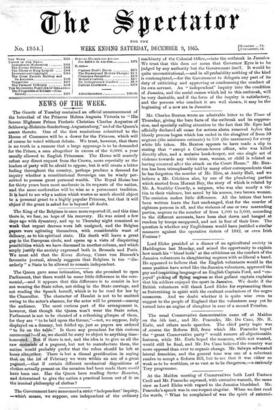The Queen gave some intimation, when she promised to open
Parliament, that there would be some little difference in the cere- monial,—and it appears that this difference is to consist in her not wearing the State robes, not riding in the State carriage, and not reading the Speech herself, which is to be read for her by the Chancellor. The character of Hamlet is not to be omitted owing to the actor's absence, for the actor will be present—among the audience. The most curious part of the arrangement is, however, that though the Queen won't wear the State robes, Parliament is not to be cheated of a refreshing glimpse of them, for they are "to be laid upon the throne,"—not, we suppose, fully displayed on a dummy, but folded up, just as papers are ordered "to lie on the table." Is there any precedent for this curious ceremonial?—if so, we should be sorry to object to anything time- honoured. But if there is not, and the idea is to give us all the raw materials of a pageant, but not to manufacture them, the nation would probably prefer that the robes should be left at home altogether. There is but a dismal gratification in saying that on the Id of February we were within an ace of a great pageant,—that if certain different mechanical dispositions of clothes actually present on the occasion had been made there mould have been one. Has the Queen been reading Sartor Resartus, and determined to give the nation a practical lesson out of it on the ironical philosophy of clothes ?


































